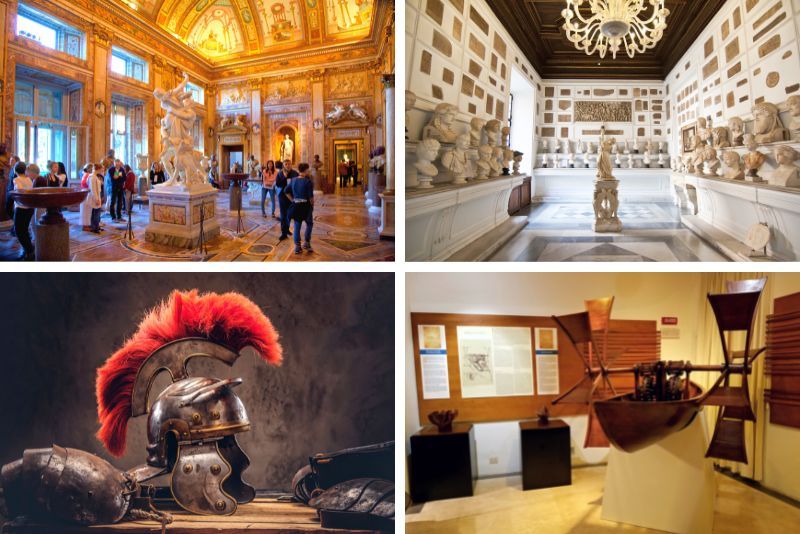Vatican Museums: Tickets and Tours
Founded by Pope Julius II and enlarged by the popes from the seventeenth century onward, the Vatican Museums boast one of the world's greatest art collections.
With your Vatican Museums ticket, you can admire priceless works of art from the Papal collections and marvel at masterpieces from antiquity to the Renaissance, including Michelangelo’s legendary frescoes.
The Vatican Museums attract more than 6 million visitors annually and are considered among the most important museums in the world.
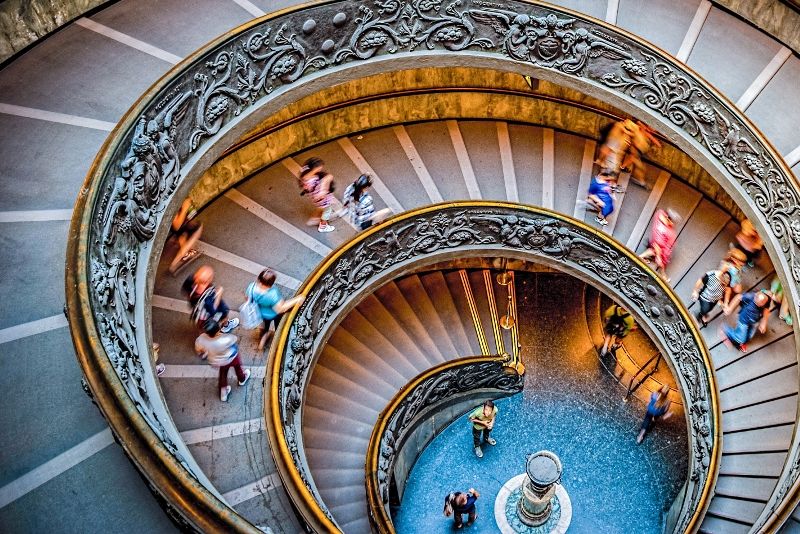
Here's everything you need to know about Vatican Museums, one of the most breathtaking museums in Rome.
How much do Vatican Museums tickets cost?
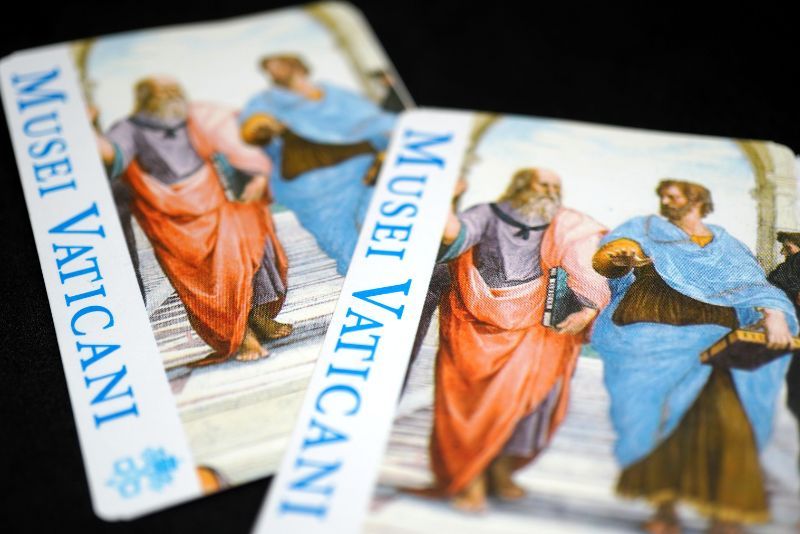
It depends. Vatican Museums tickets have different prices if you buy them in person or online. You can also book tickets with or without a guided tour. Free and reduced prices are available for eligible visitors.
Standard Vatican Museums tickets
Standard tickets to the Vatican Museums can be purchased in person at the ticket office on the day of your visit.
- Standard ticket price: €17
- Reduced ticket price for visitors under 18, students under 26 and members of a group on a pilgrimage: €8
- All children under 6, disabled visitors plus one companion and university professors of certain disciplines have free admission.
Skip-the-Line Vatican Museums tickets
Buy a skip-the-line Vatican Museums ticket online in advance to avoid waiting in line at the ticket office on the day of your visit.
- Skip-the-line ticket price: €22
- Reduced skip-the-line ticket price for visitors under 18, students under 26 and members of a group on a pilgrimage: €13
- All children under 6, disabled visitors plus one companion and university professors of certain disciplines have free admission.
Breakfast at the Vatican Museums tickets
Did you know you can have a full American-style breakfast in the Vatican Museums before starting your visit? If you want to dig into some divine pancakes, book this ticket for breakfast and entry to the museums.
- Standard ticket price plus breakfast: €40
- Reduced ticket price plus breakfast for visitors under 18, students under 26 and members of a group on a pilgrimage: €31
Lunch at the Vatican Museums tickets
Did you know you can take an Italian lunch break during your visit to the Vatican Museums? There’s nothing like a big plate of pasta to give you the energy to explore all the wings of the Vatican Museums.
- Standard ticket price plus lunch: €41.50
- Reduced ticket price plus lunch for visitors under 18, students under 26 and members of a group on a pilgrimage: €32.50 or €22 (full Italian menu or kids’ menu)
Audioguides
You can add an audioguide to any of the Vatican Museums tickets listed above for €7, or €5 for children under 12. The audioguides are available in English, French, Italian, Portuguese, Spanish, Russian, Japanese, German, Chinese and Korean.
Vatican Museums Prime Experience tickets
The Prime Experience tickets give you early access to the museums with a guided tour followed by a full American-style breakfast. If you want to dig into some food and culture, book this ticket for breakfast and early entry to the museums.
- Standard ticket price plus breakfast and early entry: €68
- Reduced ticket price plus breakfast and early entry for visitors under 18, students under 26 and members of a group on a pilgrimage: €59
Vatican Gardens and Sistine Chapel tickets
You cannot buy individual tickets to the Vatican Gardens, nor are they included with a Vatican Museums ticket. You can only visit the gardens by booking a guided tour of the Vatican Gardens and the Sistine Chapel.
- Standard ticket price: €40
- Reduced ticket price for visitors under 18, students under 26 and members of a group on a pilgrimage: €31
- All children under 6 have free admission.
Gardens of the Pontifical Villas tickets
The Gardens of the Pontifical Villas are not actually part of the Vatican and are located at Castel Gandolfo — 25 kilometers southeast of Rome.
This ticket doesn’t include the train ride from Vatican City, but it includes shuttle transport to the 30-hectare gardens overlooking Lake Albano, which have served as the Pope’s summer retreat for centuries.
- Standard ticket price: €20
- Reduced ticket price for visitors under 18, students under 26 and members of a group on a pilgrimage: €15
- All children under 6 have free admission.
You have the option to bundle this ticket with entry to the Apostolic Palace for an additional €7, which is 50% off the standard price.
Who can get discounted Vatican Museums tickets?
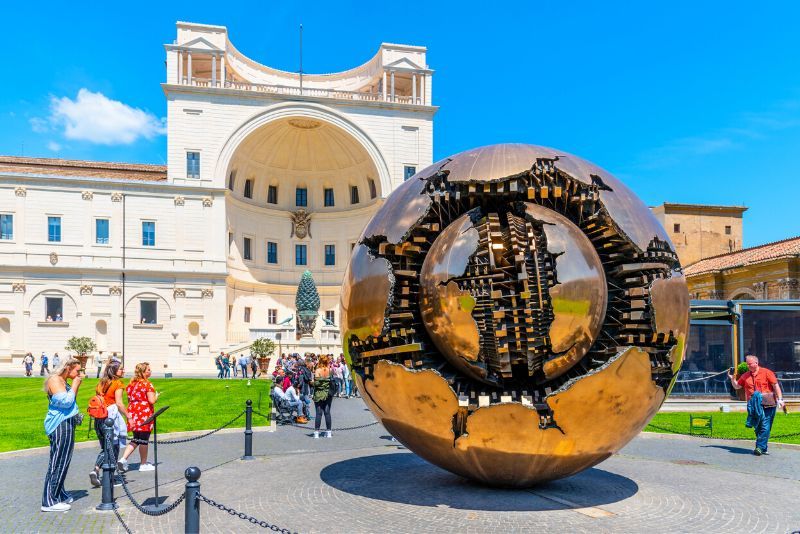
Visitors under 18, students under 26 and members of a group on a pilgrimage are eligible for a discount of €9 off the standard ticket price.
There is also a family discount reserved for families composed of one mother, one father and at least two children between 6 and 18 or students under 26. The second and subsequent child or student has free admission. That’s a buy three and get one or more free deal!
Be sure to bring proof, such as a passport/ID, student card or the signed request letter from your religious institution, or you could be charged full admission at the entrance.
Can you visit the Vatican Museums for free?
Yes! On the last Sunday of each month, everyone can visit the Vatican Museums for free. However, bear in mind that the lines will be super long.
All children under 6, disabled visitors plus one companion, the priest of a pilgrimage group and university professors of certain disciplines always have free admission.
Only university professors who teach archeology, art history, architecture and ethnology, or those based at an institution in Rome, have free admission to complement related lectures, and only after having received permission from the Directorate prior to the visit.
How do you skip the line at the Vatican?
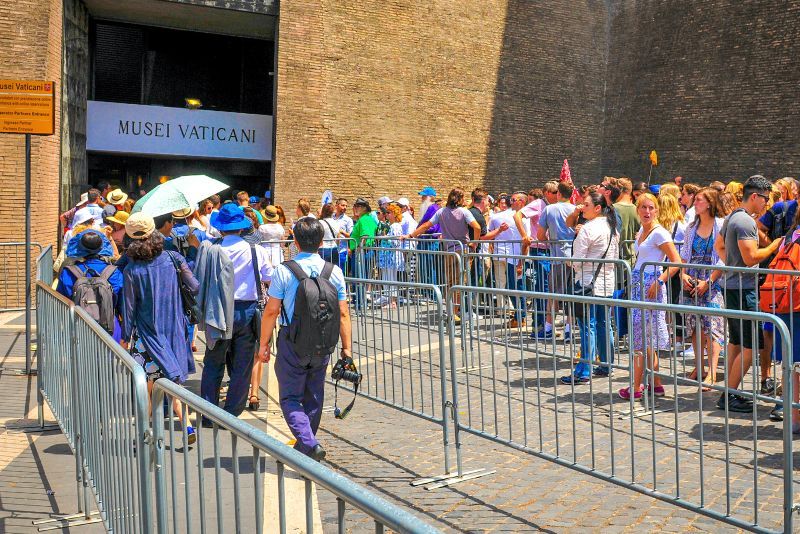
Almost as famous as the masterpieces in the Vatican Museums are the long lines to get in. This is why we strongly recommend you book your Vatican Museums tickets online ahead of time.
By booking online, you will be able to skip the line and head straight inside the Vatican Museums.
Should you book Vatican Museums tickets in advance?
Yes! Booking your Vatican Museums tickets online in advance is the only way to skip those notoriously long lines. The extra €5 fee is certainly worth it. Otherwise, you could spend hours waiting outside instead of already being inside enjoying the museums.
Another option to consider is booking a guided tour with skip-the-line tickets included in the total price. That’s the best way to have a stress-free day and fully make use of your time exploring the Vatican Museums.
Is the Sistine Chapel included in the Vatican tickets?
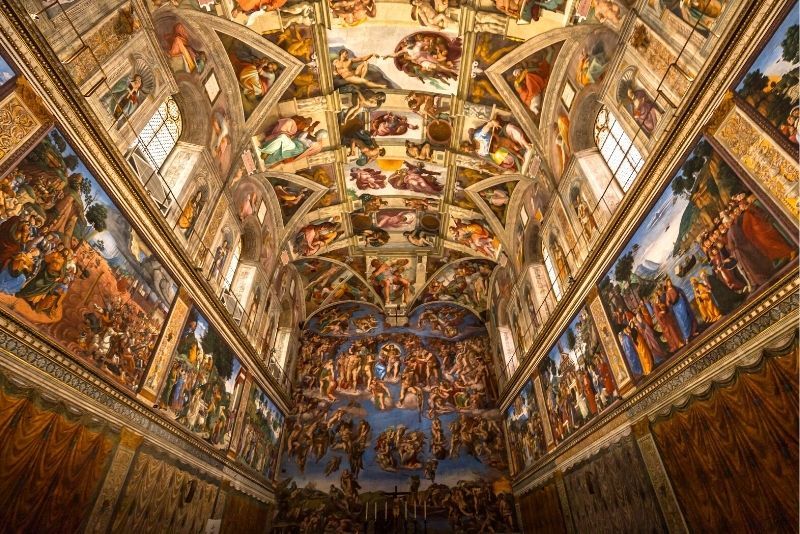
Yes, the Sistine Chapel is included in your Vatican Museums tickets. However, due to high demand, there is always an enormous line at the entrance to the Sistine Chapel.
You should consider booking Vatican Museums early access tickets to head straight to the Sistine Chapel before all the crowds.
Is the St. Peter’s Basilica included in the Vatican Museums ticket?
St. Peter's Basilica is free of charge. However, you must wait in line and pass a security check.
If you don't want to wait in line, you must book a Vatican Museums guided tour, including a visit to St. Peter's Basilica.
You can also choose a guided tour to climb St. Peter's dome, where you will have the chance to scale 551 steps to the top of the dome for breathtaking views of Rome.
Are the Vatican Gardens open to the public?
The Vatican Gardens are open to a limited number of people per day. You will need to book a guided tour as you cannot enter the gardens without a tour guide.
Vatican Gardens guided tours also include the museums and the Sistine Chapel.
Are Vatican Museums tours worth it?
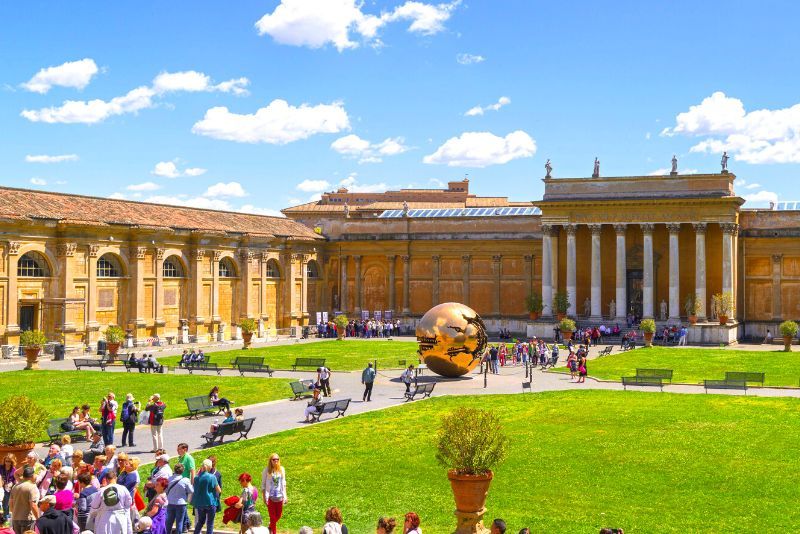
Yes! Guided tours are certainly worth it. Over 22 different galleries make up the Vatican Museums, so it is easy to get lost and overwhelmed. A guided tour helps you make the best of your time at the Vatican Museums.
You skip the line: Your tour guide will be waiting for you at the entrance with your tickets in hand, so there’s no need to wait in line among the crowds of people. Even skip-the-line tickets have a fast-track line to wait in. However, most guided tours will take you straight inside the Vatican Museums.
You will learn more: Your tour guide will be there to provide the historical context vital for fully appreciating the art and architecture of the Vatican. Your guide will also ensure you don’t miss the most important sights and answer any questions you may have.
You can pick the best tour for you: From group tours to private tours, and audioguide tours to tours designed for kids, there are so many options to choose from. Our search tool makes it easier to find the tour that best fits your needs and budget.
What are the best Vatican Museums tours?
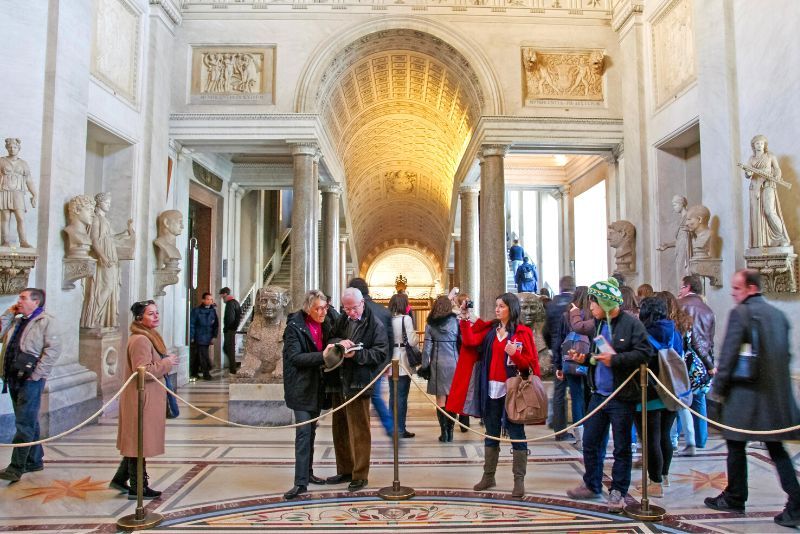
Guided Vatican Museums tours
With over 20,000 paintings and sculptures on exhibition, you’re not expected to know everything about what you’ll see inside. On guided tours of the Vatican Museums, you have a guide to make sure you don’t miss the most impressive works of art and that you fully appreciate the historical importance of each piece.
Although there is certainly plenty to see at the Vatican Museums for an entire day, you can also book a half-day or full-day tour that includes other important sights in Rome, such as the Colosseum and Roman Forum or the Catacombs of Rome.
A great benefit of guided tours is that they include true skip-the-line access. Even skip-the-line tickets have a fast-track line to wait in. However, most guided tours will skip both the normal and fast-track lines to take you directly into the Vatican Museums. This is especially important during the high season when both lines can get very long.
Private tours of the Vatican Museum
If you’re looking for a more personalized experience, then Vatican Museums private tours with your very own guide are just the thing. The tour can focus on what you’re most interested in, from specific works of art and architecture to the rich cultural and religious history hidden around every corner.
You can choose from small group tours of up to 10 people, semi-private tours of up to 6 people or private tours exclusively for your own group. With a small group, you will have a more personal experience and be able to appreciate the Vatican Museums at your own pace.
You will have the guide’s full attention for any questions you might have, just not inside the Sistine Chapel, where everyone must remain silent. Make sure to switch that phone to vibrate!
Private tours can be combined with visits to other sites, such as the Vatican Gardens, St. Peter’s Basilica and the Sistine Chapel. You can also choose from tours lasting only a few hours or half-day and full-day tours with pickup directly from your hotel.
Vatican Museums at night tours
Your visit to the Vatican Museums doesn’t have to be one where you’re jostling with sweaty tourists under a sweltering sun. Vatican Museums at night tours allow you to avoid the heat and the largest crowds.
Only available on Fridays and Saturdays from May to October, at-night tours are a good way to avoid the crowds that pack into the Vatican Museums during the day. This way, you will be able to take your time admiring each work of art without worrying about being in someone’s way.
These are generally private or small group tours, which are capped at 12 or 18 people. As these tours can only take place on the weekend to a limited number of people, be sure to book your tour ahead of time as they tend to sell out weeks or months in advance.
Family-friendly tours of the Vatican
If you’re hoping to keep your kids entertained while they learn a bit about the history of the Vatican and the artworks in the museums, then you can book a tour that has been specially designed for kids.
Specially-trained guides will uncover the mysteries hidden in the paintings and sculptures of the Vatican through stories that are engaging for children of all ages (and the curious child inside each one of us).
These are generally private tours, which allows the guide to design the tour specifically for the needs and interests of your family. Scavenger hunts, trivia and iPad games are some of the fun activities in store for your little ones to get the most out of their time at the Vatican Museums (and so the parents can take a break from figuring out how to keep them entertained!).
Early access tours to Vatican Museums
Avoid the bulk of the crowds at midday and enjoy a more leisurely tour experience. Early birds can take an early access tour of the Vatican Museums to beat the heat and the crowds of tourists.
Tours start before 8 AM, and you enter just as the Vatican Museums are opening for the day. Tours are generally small groups of less than 15 people or private tours. Some even guarantee a highly-qualified tour guide, who has a Ph.D. degree in either archaeology or art history.
Are there any combined tickets or tours including the Vatican and other attractions?
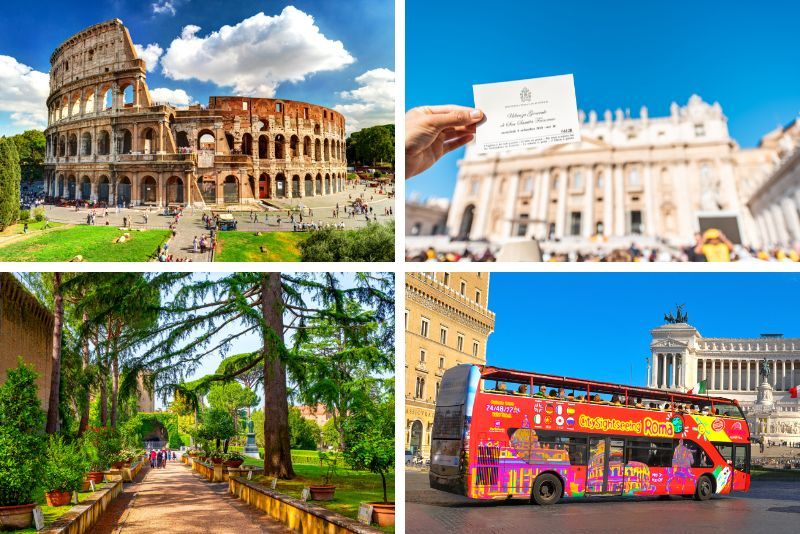
Yes! If you wish to visit several attractions in Rome during your holidays, combined guided tours are great for saving time and money. You can include must-see experiences, such as stepping foot in the Colosseum and receiving the Pope’s blessing in person at a Papal audience.
- Vatican Museums and the Colosseum: Visit the two most important attractions in Rome, the Vatican and the Colosseum & Roman Forum.
- Vatican Museums and a Papal Audience: Nearly every Wednesday, you can have the once-in-a-lifetime opportunity to see the Pope in person at a Papal Audience in St. Peter’s Square.
- Vatican Museums and the Vatican Gardens: Half of the Vatican is actually composed of the Vatican Gardens, which you can only visit as part of a guided tour.
- Vatican Museums and a hop-on hop-off bus tour: Enjoy skip-the-line access to the Vatican Museums plus a hop-on hop-off sightseeing bus tour in Rome.
What will you see inside the Vatican Museums?
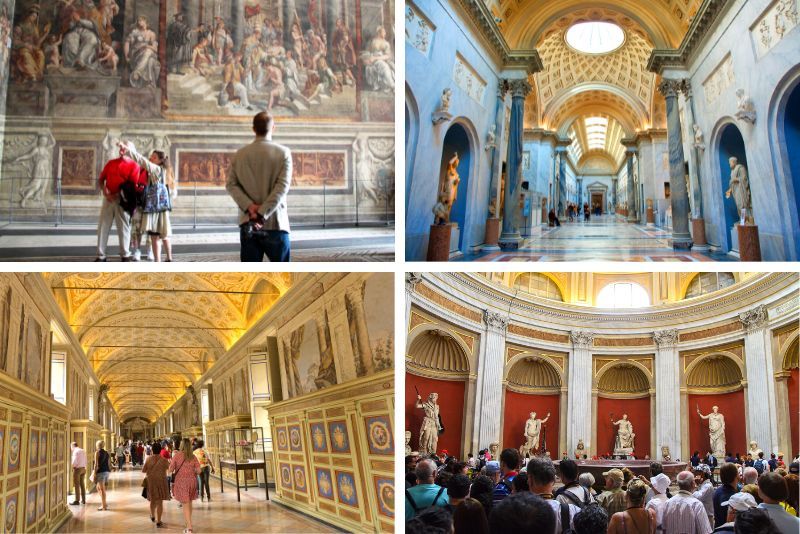
The Vatican Museums house an incomparable collection of over 70,000 paintings and sculptures, although only 20,000 are currently on display. The museums date back to the 16th century when Pope Julius II created the concept and began contributing art to the legendary displays.
The Sistine Chapel and St. Peter’s Basilica are the two stars of Vatican City. The Sistine Chapel features Michelangelo’s world-famous ceiling mural, while St. Peter’s Basilica is an impressive feat of Renaissance architecture and stands as the largest church in the world.
Besides the Sistine Chapel and St. Peter’s Basilica, you can also explore dozens of museums in the Vatican. Here you will find on display contemporary and classical works of art by the best painters and sculptors to have ever picked up a brush or chisel.
Over 6 million people visit the Vatican Museums each year, making it one of the most visited art museums in the world. You could spend weeks or even months exploring all the works in the museums. However, if you only have a day, be sure you don’t overlook the masterpieces described below.
The Sistine Chapel
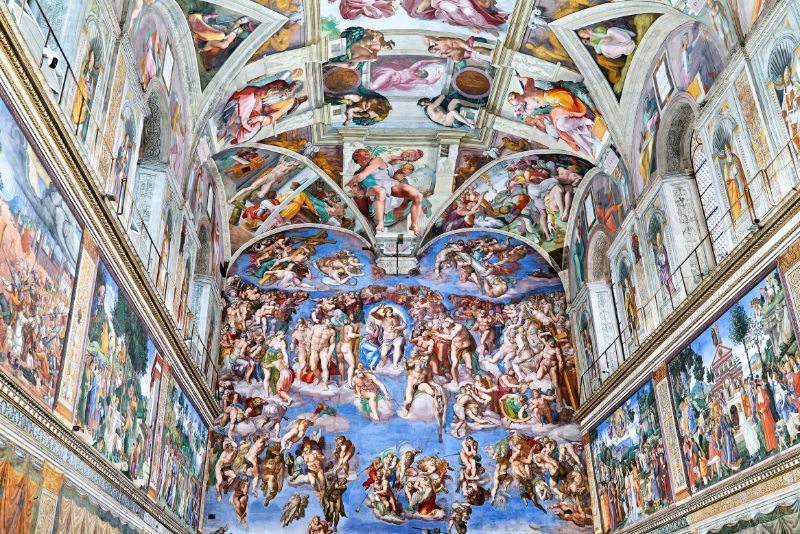
Here, you will find some of Michelangelo’s most timeless works. If you look up, you will see God stretching out his finger to mankind in “The Creation of Adam,” which is actually only one panel in a series of murals spanning 40 meters across the ceiling.
In front of you, covering the entirety of the altar wall, you can gaze at Michelangelo’s incomparable fresco “The Last Judgement,” which reaches 14 meters high and stretches 12 meters across with over 300 figures depicting the Second Coming of Christ.
This chapel still serves as the site of the papal conclave, which is a tradition dating back centuries where the cardinals will meet to choose a new pope. People will gather to observe the color of the smoke leaving the chapel's chimney until white smoke declares that a new pope has been chosen!
St. Peter’s Basilica
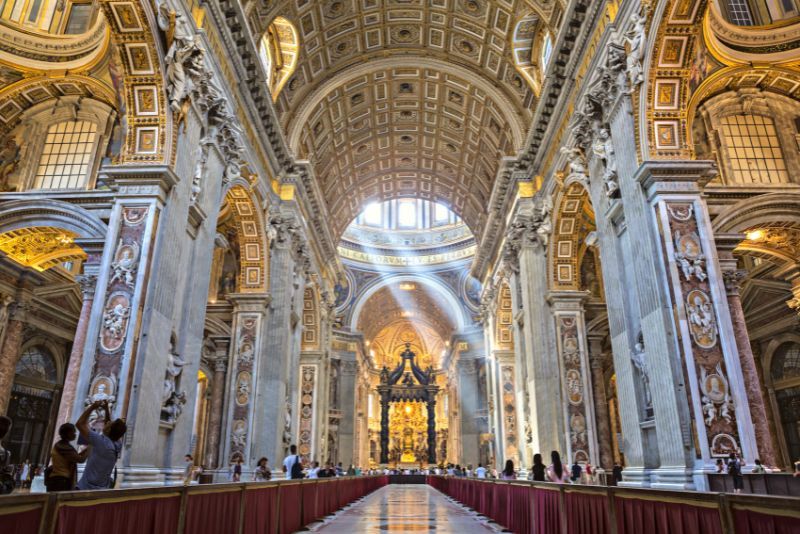
Standing tall and wide as the largest church in the world is St. Peter’s Basilica. This impressive feat of Renaissance architecture covers over 23,000 square meters. By law, its dome is the tallest building in Rome and reaches a height of 136 meters.
Besides appreciating the size and intricacy of the architecture, you will also be able to appreciate frescoes and sculptures — the most well-known being Michelangelo’s “La Pietà.” This masterpiece is all the more impressive considering that he carved it when he was only 24 years old!
Another highlight is Bernini’s baldachino, which is a canopy directly under the dome to mark the burial site of Saint Peter. Christians will call to mind Jesus’s reference to this in the Bible when he proclaimed, “you are Peter, and on this rock, I will build my church” (Matthew 16:18).
Bernini constructed four bronze columns that sit on marble plinths and reach a height of 20 meters to mediate the vastness of the church to the human scale, much like Jesus mediated the glory of God for humanity.
Please be aware that St. Peter’s Square and the Basilica are inaccessible on Wednesdays until noon as part of a Vatican Museums tour due to the weekly Papal Audience. If you plan to visit on a Wednesday, you can buy separate tickets to attend the Papal Audience.
The Raphael Rooms
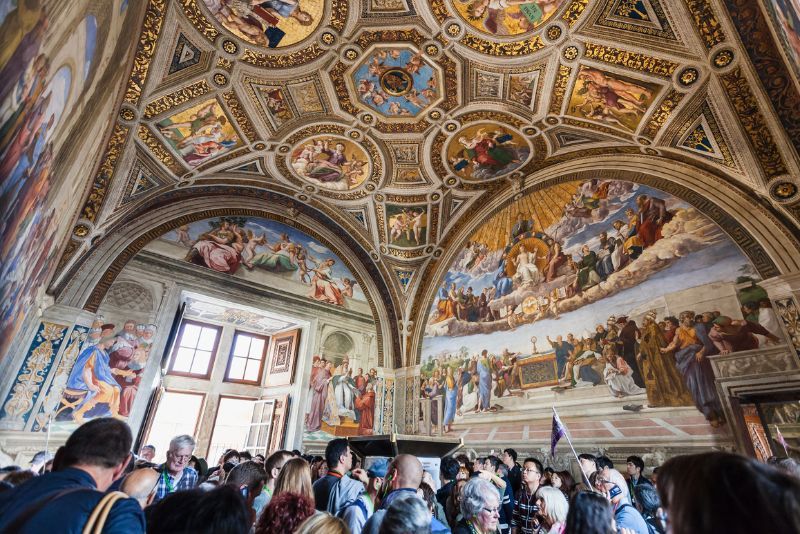
Divided into four grand rooms, here you will find the masterworks of the great Renaissance artist Raphael. Giant frescoes depicting mythological and historical events adorn the walls and ceilings of each room.
The most famous of these paintings is The School of Athens. If you look closely, you can see Raphael included a self-portrait, as well as portraits of some of the brightest minds of his own time and antiquity, including Da Vinci, Michelangelo, Plato and Aristotle.
Pio Clementino Museum
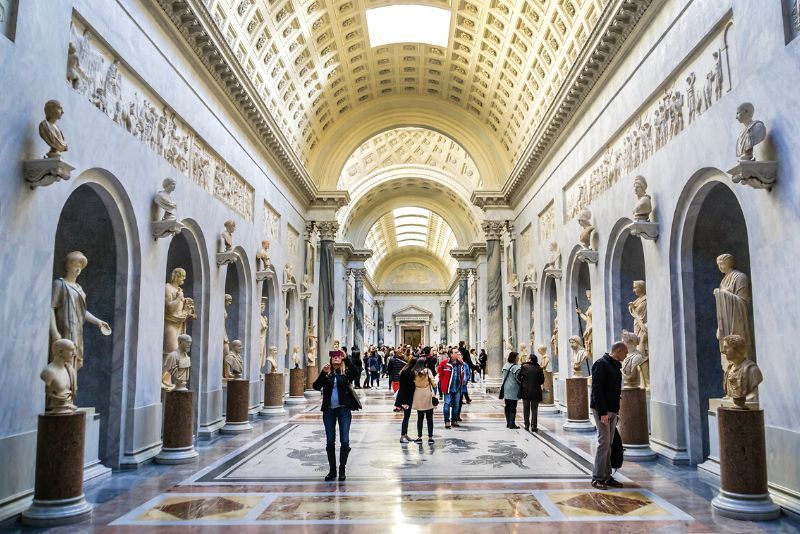
Here you will find one of the most historical pieces in the Vatican Museums — the Belvedere Torso. Only a fragment remains of this marble statue of a male nude, which dates back to the first century BC.
You can see the influence this piece had on Renaissance artists, including Raphael and Michelangelo, if you pay attention to the male figures in their paintings and statues. For example, Saint Bartholomew in Michelangelo’s “The Last Judgement” bears a strong resemblance to the Belvedere Torso.
The Pinacoteca
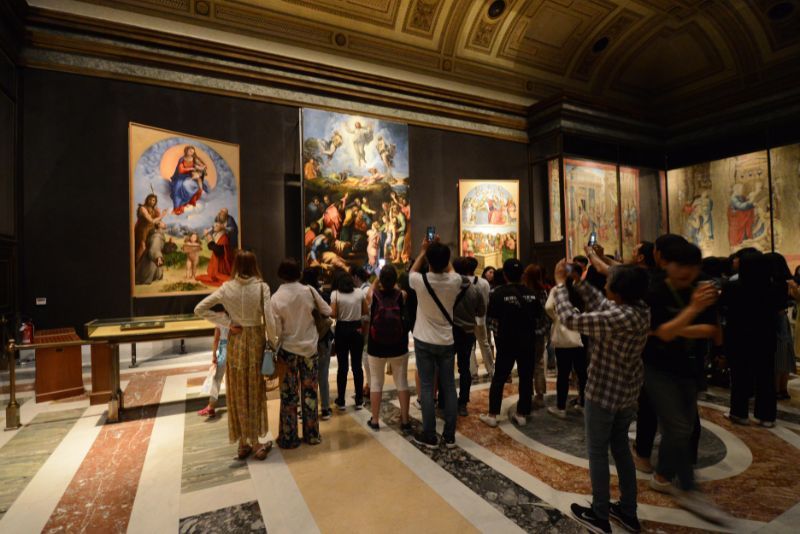
In Room IX of the Pinacoteca, or Art Gallery, you will find Leonardo Da Vinci’s only work in the Vatican Museums, which is actually an unfinished painting known as “St. Jerome in the Wilderness.”
This is only one of many timeless paintings you will see here. Bellini’s “Pietà,” Raphael’s “Madonna of Foligno” and Carvaggio’s “The Entombment of Christ” are some of the other masterpieces you can appreciate in the Pinacoteca Vaticano.
Borgia Apartments
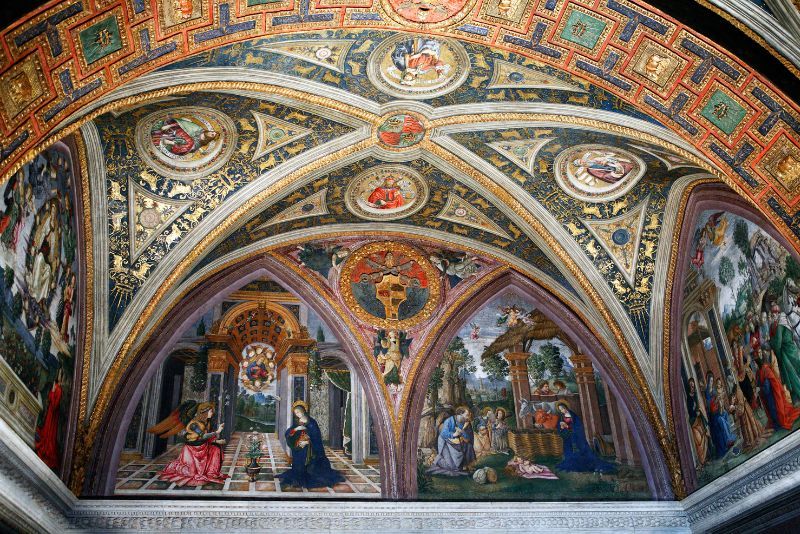
Bernardino di Betto, or Pinturicchio as he was often called due to his small stature, is responsible for the design and frescoes that decorate the six rooms of the apartments once inhabited by Pope Alexander VI, or Rodrigo de Borja.
Today, most of the rooms house the Vatican Collection of Modern Religious Art, which includes Vincent Van Gogh’s “Pieta,” Salvador Dalí’s “The Announcement” and August Rodn’s “The Thinker.”
The Belvedere and Pine Courtyards
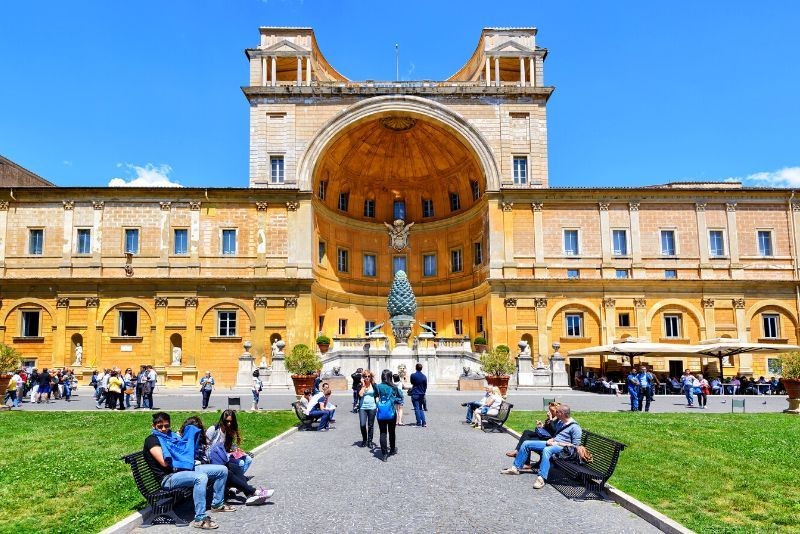
At first glance, this area appears to be a single courtyard, but it is actually divided into a lower terrace, Cortile del Belvedere, and an upper terrace, Cortile della Pigna.
The upper terrace gets its name from the four-meter bronze pinecone adorning the vast niche in the wall of the Vatican, which was once a Roman fountain and dates back to the first century AD. Dante mentions this pinecone in his Divine Comedy to describe a giant’s head as “long and large as is at Rome the pine-cone of Saint Peter's.”
On the west side of the Belvedere Courtyard, you will find the Gallery of Maps. Instead of frescoes portraying religious and historical events, this gallery has a more geographical theme with paintings outlining regions of the Italian peninsula.
Vatican Gardens
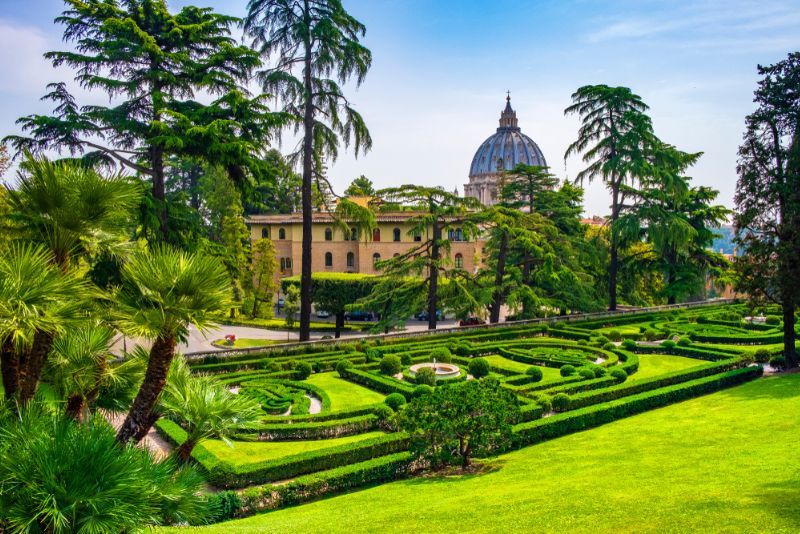
Although the Vatican Gardens are not part of the Vatican Museums, you can book guided tours that include the gardens with your visit to the rest of the Vatican. This is actually the only way to visit the Vatican Gardens, as you cannot explore the gardens on your own, but only as part of a guided tour.
The Vatican Gardens cover 23 hectares, which is about half the area of the entire Vatican! Legend has it that the gardens were founded with soil transported from Mount Calvary, where Jesus Christ and thousands of early Christians were once crucified.
Pope Francis only opened these gardens to the public in 2014, so it is a rather new opportunity for you to be able to see this more secluded area of the Vatican. Besides its statues and fountains, a highlight of the gardens is the collection of Blessed Virgin Mary shrines. Countries from around the world have been gradually adding to the collection since the early 20th century.
How do you reach the Vatican Museums?
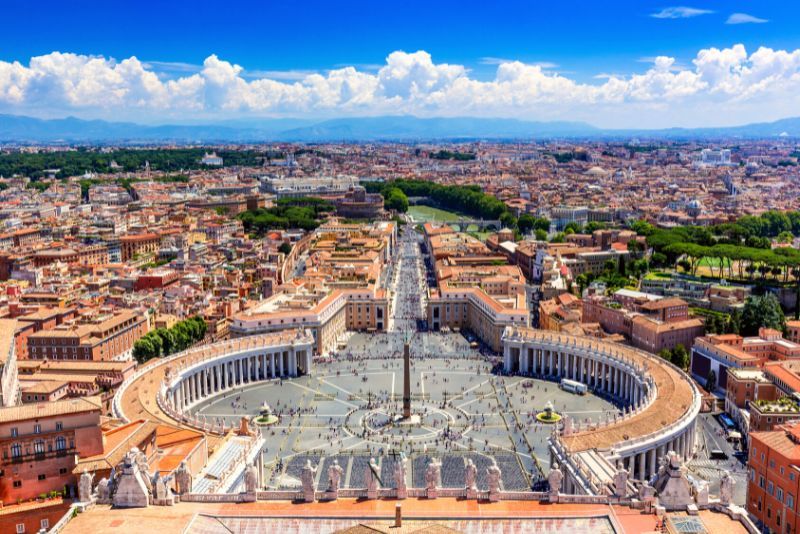
By metro
Take Line A to Ottaviano station. Then, walk for about 10 minutes southwest to the entrance of the Vatican Museums.
By bus
Take Line 49 to the stop Musei Vaticani, which leaves you at the square right in front of the Vatican Museums.
You can also take Lines 32, 81 or 982 to the stop Piazza del Risorgimento, or Lines 42 or 990 to the stop Via Leone IV / Via degli Scipioni.
By tram
Take Line 19 to the stop Piazza del Risorgimento.
By taxi
You can arrive and leave from the taxi parking at the square right in front of the Vatican Museums.
By guided tour
This is certainly the most convenient way to get to the Vatican Museums. You can outsource all the stress and concerns about logistics to your tour guide, who will pick you up directly from your hotel.
When are the Vatican Museums open?
The Vatican Museums are open Monday to Saturday from 9 AM to 6 PM. The final entry of the day is at 4 PM.
The museums are also open on the last Sunday of the month from 9 AM to 2 PM. Admission is free, but you should expect to wait in long lines. The final entry on the last Sunday of every month is 12:30 PM.
When is the best time to visit the Vatican Museums?
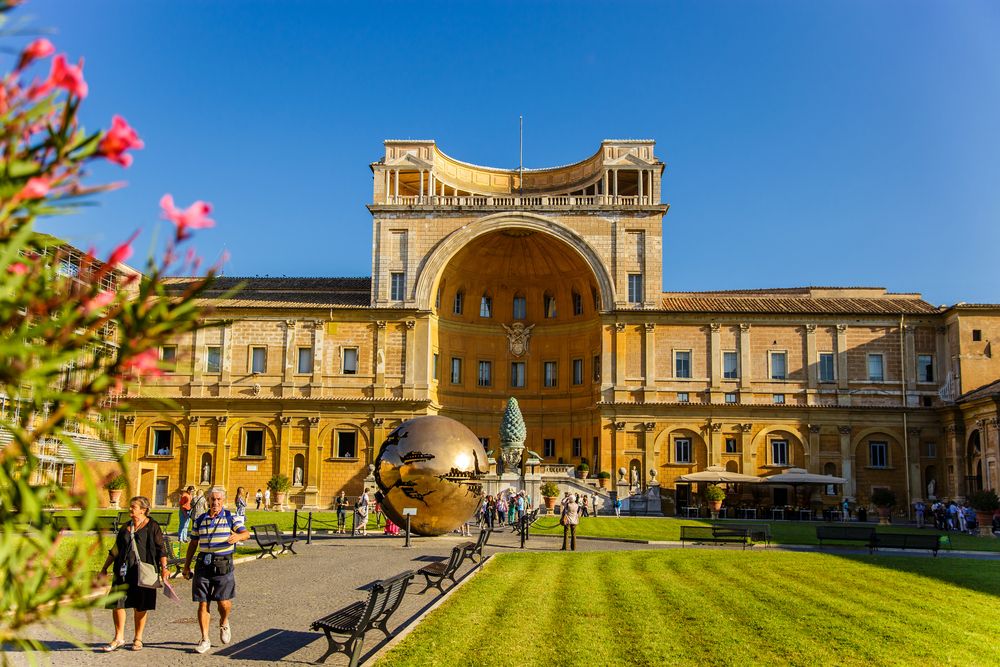
First of all, be sure to book your Vatican Museums tickets online so that you can skip the line at the entrance.
To avoid the crowds, consider planning a weekday visit, as weekends are usually much busier. Also, if you can visit in the early morning or evening, you will beat the heat and avoid the midday rush of people.
Remember that the Vatican Museums are some of the most visited museums in the world and are busy year-round, especially during the summertime when over 30,000 visitors will arrive every day.
Early morning options: If you wish to avoid the crowds, consider booking a Vatican Museums early access ticket. These tickets let you access the Vatican Museums before the regular opening hours.
Night options: Every Friday and Saturday from mid-April to October, the Vatican Museums remain open during the evening as well. Book a Vatican Museums night tour and enjoy a visit after the regular opening hours.
Know before you go
- The Vatican Museums are incredibly popular with tourists and sell out very fast. You should consider purchasing tickets weeks in advance to secure a date. Also, a fast-track entrance is a good idea due to the large crowds.
- Get the Omnia Card or the Rome Pass if you plan to visit several attractions. This will save you time and money.
- If you travel by metro, use line A direction Battistini, Ottaviano or Cipro stations.
- You must dress appropriately to enter the Vatican Museums, which means no sleeveless shirts, low-cut shorts/dresses or hats.
- Visitors are required to check in any luggage, backpacks and umbrellas before entering the Vatican Museums.
Are the Vatican Museums wheelchair accessible?
Yes, the Vatican Museums are wheelchair accessible, although there are some areas where accessibility may be limited.
The museums provide elevators and accessible restrooms, and there is a dedicated itinerary designed for visitors with mobility challenges, ensuring they can see many of the main highlights, including the Sistine Chapel.
Wheelchairs are also available for visitors to borrow, free of charge, at the entrance (subject to availability).
However, certain sections with stairs or narrow passageways may be more difficult to access. It’s recommended to contact the Vatican Museums in advance to arrange any special assistance and ensure the best possible experience.
You can find more information about the accessibility at the Vatican Museums on this page.
Which other museums can you visit in Rome?
